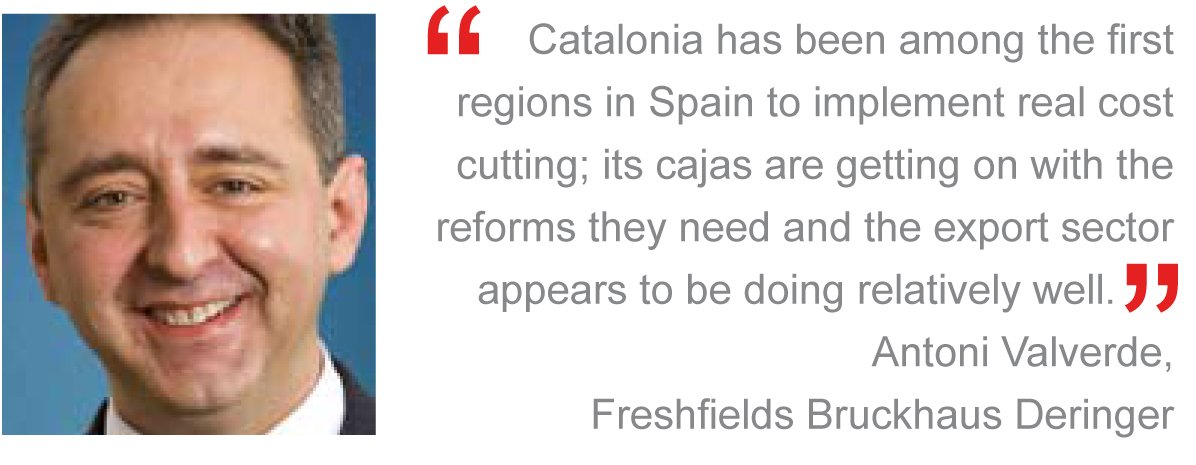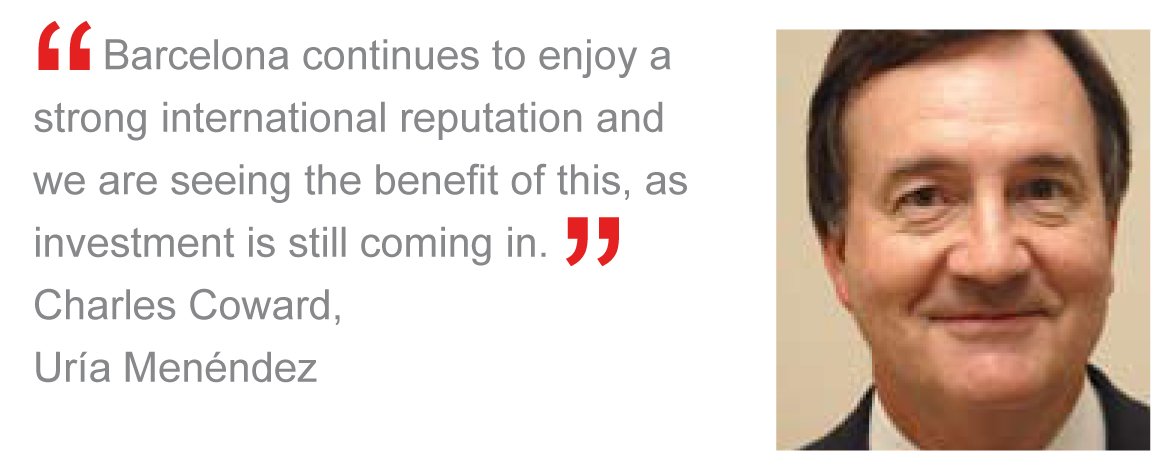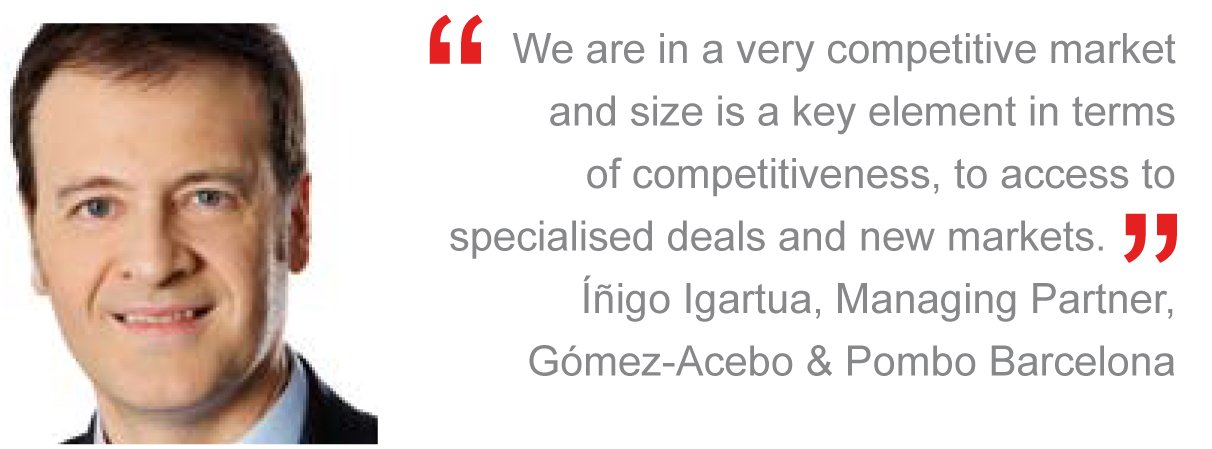Barcelona Report 2011: Finding a new economic formula
Barcelona is experiencing an ongoing process of change from a primarily industrial economy to one that is increasingly knowledge-led. The transformation is not however one that happens overnight, presenting the city and its law firms with challenges and opportunities.
No hay duda de que Barcelona ha cambiado el rumbo de su economía y seguirá haciéndolo en los próximos años. La ciudad sigue siendo uno de los núcleos de la economía española, pero su poder cada vez depende más de los servicios y las nuevas tecnologías y se aleja de su tradicional foco industrial. Ello presenta un reto para la región, pero también para los despachos.
For new arrivals to Barcelona, the short journey from El Prat international airport to the city centre tells them all they need to know about the changing economic focus and direction of the city, as well as some of the challenges facing both its business and legal communities as they move forward into the 21st Century.
The airport’s landmark €5billion south terminal, designed by renowned Catalan architect Ricardo Bofill, offers an example of the changing face of Barcelona. Travelling from which, there is a proliferation of signage for telecoms and digital conferences standing in front of vacant former manufacturing plants. In the city centre, and in contrast to Madrid, the bullring is now Las Arenas, a world-class music and entertainments venue. On arrival at the Plaça Catalunya the digital connectivity of the city is evident through the availability of free wifi.
Despite such modern conveniences this is not to say however that the city’s transition from an industrial and manufacturing economy to a knowledge-led one has been easy, say the city’s lawyers. Systemic challenges faced the city long before the emergence of the global financial crisis in 2007.
“As with the rest of Spain, Barcelona is feeling the downturn. We do not exist in isolation. Barcelona is however moving forward, opening to new sectors and new markets. Likewise within the law firm, we can feel the movement and clients are bringing in potential new transactions and projects for the motnhs ahead,” says Joan Roca, Managing Partner of Roca Junyent.
The global crisis has negatively affected both the public and private sector in Catalonia, say others. The pressure on the Government’s finances is ongoing, while local business continues to endure the contraction in consumer demand and in financing difficulties.
“Catalonia remains the most industrialised of all Spain’s Autonomous Communities, and with an unemployment rate that may be too high but is nonetheless below the Spanish average. In this complicated climate, local industry remains resistant but we have seen an acceleration of the relocation of business internationally,” says Miguel Trias, Managing Partner of Cuatrecasas Gonçalves Pereira in Barcelona.
The Catalan economy has seen significant restructuring over the past few years, with companies engaging in heavy cost cutting, including massive redundancies, says Fernando Rey, Managing Partner of Garrigues in Barcelona. “But many are now looking to new markets and returning to profitability.”
A major pressure for the region’s businesses, as elsewhere, is access to finance. The Spanish financial system as a whole lacks liquidity although the savings bank (Caja) sector is now being restructured as institutions respond to Government pressure to ensure capital adequacy levels are met and maintained.
“The cajas’ problems and the regional debt has undermined the reputation of the local economy. However, Catalonia has been among the first regions in Spain to implement real cost cutting; its cajas are getting on with the reforms they need and the export sector appears to be doing relatively well,” says Antoni Valverde, corporate partner with Freshfields Bruckhaus Deringer in Barcelona.
Spain’s largest caja, Barcelona-based La Caixa, is one of the few in good health, having passed the Government’s recent round of stress tests and is to restructure into a new listed entity Caixabank. Smaller Catalunya Caixa has not however fared so well and is among the relative few so far to have asked for Government financial assistance.
Despite the general economic situation, there are signs of a regional economic recovery, says Sergio Agüera, partner with Pérez-Llorca. “Although we are seeing some positive economic indicators thanks to improved exports by Catalan industry, growth in international and Spanish tourism and a rise in interior consumption, this is likely to be a year of transition. While we would certainly like to be optimistic we also have to be realists.”
The upturn has not yet therefore translated into a clear increase in new deals in Catalonia, say lawyers. To date it is predominantly those businesses that have looked to internationalise that are seeing the most activity and the best prospects.
Others note that many major Catalan businesses, while clearly affected by the downturn, have however proved more resilient.
“As a result of the crisis many Spanish businesses have seen ownership changes and the relocation of significant parts of their operations. But here we still see strong performances by family-owned businesses, which have expanded across Spain as well as in to very competitive markets, like the US and Brazil,” says Esteban Raventós, Managing Partner of Baker & McKenzie in Barcelona.
Carlos Valls, Managing Partner of local firm Iuris Valls agrees: “Thanks to new technologies and good reputations geographic limitation becomes less significant. The national and international spread of our clients should be taken as an opportunity for recommending us also to their own contacts.”
The economic situation and evolution of the region’s economy is therefore raising demand for new types of legal service and expertise. “Barcelona continues to enjoy a strong international reputation and we are seeing the benefit of this, investment is still coming. But clients do face challenges and many are placing more emphasis on their external lawyers to help them overcome them,” says Charles Coward, Senior Partner with Uría Menéndez in Barcelona.
A change of emphasis
Barcelona undoubtedly has attractions. The city is ranked among the best in Europe in terms of quality of life and in which to set up a business. Over the past decade Catalonia as a whole has seen the continued expansion of industries such as chemicals, pharmaceuticals, packaging, agro-food, automobiles and electronics, as well as the growth of sector-led and boutique firms such as Grau & Angulo, Fornesa Prada Fernández and Rousaud Costas Duran (RCD).
“An unknown is the Catalan economy’s capacity for investment in research, development and innovation which remains tremendously challenging due to difficulties in securing financing from banks and cuts in public subsidies. Nevertheless, the financial crisis is still viewed as an opportunity for entrepreneurs and those with innovative ideas,” says Enrique Marinel-lo Jordan partner at Monereo Meyer Marinel-lo Abogados (mmmm).
There is no doubting the change that is being promoted in Barcelona, says Trias at Cuatrecasas. “We live in a time of change and transition. The knowledge economy and services sectors can present a way forward. There is an abundant network of research activity, medical centres and innovation-focused businesses that now allow us to foresee a situation radically different to that we have today.”
The traditional industrial base of Catalonia is therefore diminishing. Industrial areas like textile manufacturing have almost disappeared while fashion and brand-oriented companies are increasing, among the region’s leading businesses Mango, Desigual and Pronovias.
The El Valles and 22@Barcelona districts are also steadily emerging as technology clusters and companies like Telefónica, Indra and SAP now have large R&D centres in the city. But undoubtedly a continuing challenge is to project the “brand” Barcelona, say lawyers, and to associate the city with high value and knowledge-led businesses.
Lawyers admit however that the transition from an old economy to a new economy does not happen overnight, and that barriers to entry do still exist. “Catalonia, and Spain as a whole, is not always an easy place in which to do business. Companies can find a lot of administrative burdens in their way, even when it comes to company formation,” says Gabriel Nadal, now Managing Partner of the expanding office of Ecija, although previously a partner with local firm Jausàs.
Lawyers suggest that further incentives are also required to encourage these new types of enterprise. “We need greater emphasis to encourage more R&D and to attract the headquarters of foreign multinationals to the city. Barcelona already has two of the best business schools in the world – ESADE and IESE – but the region must still primarily focus on innovation, technology and services,” believes David Miranda, partner at Osborne Clarke.
The end of 2010 did however see a change in the Catalan regional government, which presented a vote of confidence for the ideas of the new Assembly and generated expectations for a resurgence of the economy, say lawyers. Regional tribalism has given way to economic realism.
“Over the coming years the main tasks of the regional Government will be to reduce unemployment – currently around 600,000 people in February 2011 – by creating new long-term investment opportunities, a recovery of trust in the Catalan economy internationally and the opening up of credit lines for small and medium enterprises,” says Marinel-lo Jordan at mmmm.
But other economic issues are also important. Notably the further enhancement of the region’s transport links. “In my opinion, what is required to make the Catalan economy more successful is to increase the investment required to compete against other European regions,” says Agustin Bou, partner at prominent local firm Jausàs. “This relates mainly to infrastructure and in particular, the Mediterranean railway corridor; surface communications and the airport.”
Legal market
Barcelona’s legal market has likewise not proved immune to the pressures affecting the rest of Spain. There is high pressure to reduce legal fees and the challenge is to reflect the changing face of the local economy, to add value and the specialisation required of this emerging new generation of businesses.
“The downturn has affected all sectors of the economy and legal services are not an exception. Our firm has been able to cope reasonably well although our commercial department has moved from intensive M&A activity to refinancing and company restructuring,” says Mireia Blanch, Managing Partner of Barcelona mid-size firm Bufete B Buigas.
Law firms cannot therefore afford to ignore their established clients, note others. “Our main strategy has been and will continue to be to stay as close as possible to our clients. The important number of family-owned business in Catalonia is significant in this respect and creates a number of day-to-day challenges, to offering first class service to the companies as well as to family members,” says Rey at Garrigues.
Firms also report growing demand for international tax planning and contractual work related to international acquisitions. Many Catalan companies have embraced globalization but the flow of investment clearly goes both ways.
Some suggest however that Barcelona is not an easy market for non-Catalan businesses or law. Others reject such opinions outright. All firms’ local offices are invariably staffed by Catalan lawyers, and firms’ international connections are increasingly important.
“We are truly international and the Catalan market knows that. We are one of the best Barcelona-based firms at this sort of thing. We have proven experience when it comes to acting as a deal counsel and we have one of the best quality networks behind us,” says Valverde at Freshfields.
 Changing places
Changing places
Some suggest however that there are emerging winners and losers in the Barcelona legal market, which is seeing moves, mergers and new openings.
“Undoubtedly mid-sized firms have a greater ability to adapt. Smaller structures also mean lower cost bases, which again helps to better weather the crisis, and in the current situation is increasingly attractive to clients who no longer want to pay ‘brand’ prices,” says José Antonio Soler at local firm Maniega & Soler.
Nonetheless the most prominent local players include local champion Cuatrecasas, Uría Menéndez, Garrigues and Gómez-Acebo & Pombo, while Barcelona-based Roca Junyent is considered by many to be doing exceptionally well. All have benefited from their national platforms while some have continued to expand internationally over the last 18 months – Uría Menéndez has opened in China, where Garrrigues, Cuatrecasas and Roca Junyent are already well-established.
Deloitte Abogados is among the firms expanding locally. Javier Menor, Co-Managing Partner of the firm in Catalonia, is himself a relatively recent recruit from Garrigues. “We see the downturn accelerating a ‘democratisation’ of the legal market and clear new opportunities. Clients’ internal pressures are forcing many to question the status quo when it comes to the level and quality of services they have traditionally received, and we hope to capitalise on this desire for change,” he says.
Gómez-Acebo & Pombo is now consolidating its local practice following the earlier integration of leading local tax firm Padrol Munté and the local office of Rodés & Sala. “We are in a very competitive market and size is a key element in terms of competitiveness, to access specialized deals and new markets. The evident fee pressure forces law firms to optimise their management and to plan their strategies,” says Íñigo Igartua, Managing Partner at Gómez-Acebo & Pombo in the city.
Other firms are also open to new opportunities. “There is a need for mid size firms to grow, more likely through mergers with other firms, in order to be able to provide the services the clients are asking for. We are already based in Madrid, and do not foresee the need to grow in other places in Spain but we are seriously considering an expansion abroad. In this case, probably Asia is the place, but nothing has been defined yet,” says Agustín Bou, partner with Jausàs.
New firms are also arriving in Barcelona with a notable trend among those from Madrid to build a local presence. Last September saw leading Madrid-based IT and media-led firm Ecija integrate Legal Link, and the recruitment of partner Gabriel Nadal from Jausàs to lead the enlarged practice.
Another firm that has experienced change over the past year is Vialegis Dutilh, the product of a merger between Madrid-based Dutilh and Barcelona firm Vialegis, to create a new top 20 90-lawyer firm, adding to the earlier integration by Dutilh of employment boutique Bufete Caldevilla.
“The major response by firms to the crisis will be in terms of gaining efficiency. The winners will be those that are better sized and have a better cost structure. There may be further mergers but the market is already quite ‘dense’ – there is little room for more new players,” says Pablo Usandizaga, co-Managing Partner of Vialegis Dutilh.
Subtle change
As with the change passing through the Barcelona economy the transformation of the city’s legal market is perhaps more the result of evolution than revolution. Like the city’s new airport terminal, which took a decade to complete, the adjustment of the local economy and legal market is subtle but cumulative.
“Efforts to change the economic emphasis of Barcelona are channeled in the right direction but we have yet to see the scale of new investment, or new economic growth, that would be enough to compensate for the lost industries or the economic losses seen in the construction sector,” says Agüera at Pérez-Llorca.
Charles Coward, a veteran of the Barcelona legal market and partner at Uría Menéndez agrees that the process is inevitably a slow one and requires administrative encouragement as much as private investment. “We have been witnessing change in the region since the 1990s, with the delocalisation of traditional heavy industries, the international expansion of family-owned companies and now the arrival of knowledge-led businesses.”
But a technology cluster does not emerge overnight. The new Catalan government has made the economy its priority and has therefore taken a “carrot-and-stick” approach, which will undoubtedly increase demand for Catalan products, services and competitiveness, note others. “This is commendable. On the one hand the Administration is making the necessary cuts in spending and on the other hand offering incentives for investment and entrepreneurship,” says Ramon Mullerat, at KPMG.
The technological path along which Barcelona is now travelling will be a productive one, hope lawyers. The journey believe many will not only secure the city’s place at the forefront of Europe’s knowledge economy but unlock the means by which their law firms may evolve too.
Despite the contrast seen by travellers as they pass through the city Barcelona is however trying to take the shortest route possible to future success.











